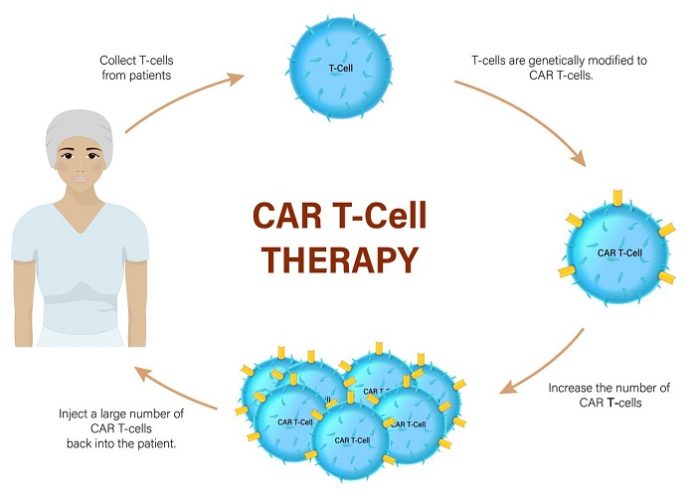A biology teacher has become the first patient in the United Kingdom to receive CAR T–cell therapy to potentially treat multiple sclerosis (MS), with experts believing the treatment could transform lives by halting or slowing down progression of the disease. The therapy is custom-built in the lab for each patient, reports The Independent.
The person’s own T-cells, which are crucial for hunting out infected or damaged cells, are genetically engineered by scientists and fed back into the patient via an infusion to “re-set” the immune system.
CAR T for MS modifies the T-cells to recognise and kill B-cells, which are known to cause damage and allow MS to advance.
Emily Henders (37) received her therapy last week at University College London Hospital (UCLH) as part of a global clinical trial into whether it can treat MS.
The CAR T-cell therapy being tested in this trial was invented by scientists from the UCL Cancer Institute, led by Dr Martin Pule, and has delivered promising results in treating patients with an aggressive blood cancer.
So far so good
The mother-of-two said she was feeling well after receiving the infusion in a three-minute procedure.
“I’m actually feeling good,” she said. “I’m feeling normal, I’ve got energy back, and I don’t have any nausea.”
Henders was diagnosed with MS in December 2021 after suffering tingling in her hands. Her father has the condition and she was aware what the symptoms could indicate.
Since then, she has suffered four debilitating relapses, despite taking one of the most highly effective medications for the disease.
“When I’m having a relapse, not being able to move my legs means I can’t get around the house, I can’t help with the kids, I can’t drive, and then that affects everybody around me as well.”
She said a good outcome of CAR T-cell therapy for her would be to “never experience a relapse again, although obviously the ideal would be a cure”.
“When I have my relapse, my legs don’t work, I can’t walk. It’s scary. Amazingly, every time I have had a relapse, I do get that sensation back, but that fear is always there.
“So to never wake up and experience that would be fantastic. MS can have a really like gradual and slow decline, and the probability of ending up in a wheelchair with MS is high.
“Hopefully this treatment will avoid that.”
UCLH consultant haematologist Claire Roddie said the treatment offers real hope for MS patients and has shown success in cancer and the autoimmune disease lupus.
“Our ultimate goal is to achieve long periods of disease remission with a single, one-time CAR T-cell treatment,” she said, adding it could mean people can come off all their other drugs.
“CAR T-cells also go to places in the body that other drugs don’t necessarily get to very effectively.
“If you’ve got multiple sclerosis, and the cells that are driving that are sitting somewhere in your nervous system or around your nerves, it’s quite difficult for regular drugs to get there, to deplete them.
“So this offers a tangible potential solution. And hopefully you don’t need any more drugs beyond that point. If we could achieve that in MS, it would transform so many people’s lives.”
Dr Wallace Brownlee, consultant neurologist and clinical lead for the multiple sclerosis service at the National Hospital for Neurology and Neurosurgery, as well as principal investigator on the trial, said the real promise of CAR T-cell therapy is that it can be given just as a single treatment, potentially freeing people from a future of needing to take immune-suppressants.
“This is an exciting new frontier in the treatment of autoimmune conditions.”
The trial aims to recruit up to 18 patients globally by early 2027.
See more from MedicalBrief archives:
FDA approves CAR-T cell therapy for some large B-cell lymphomas
CAR-T cell therapy for leukaemia associated with less dangerous side effects

